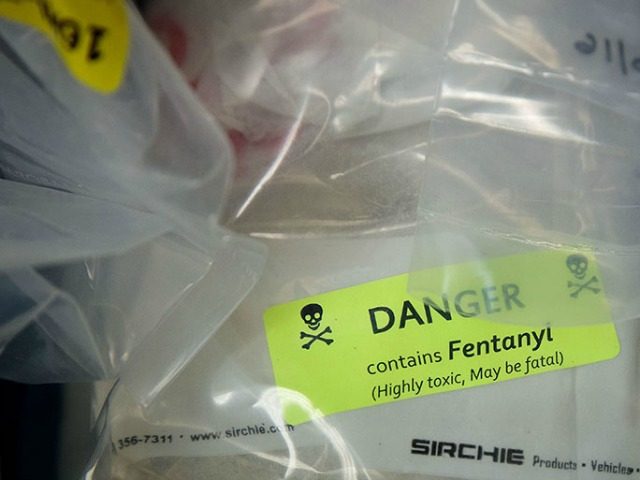Mexican Federal Police assigned to drug interdiction at Tijuana’s Abelardo L. Rodríguez International Airport seized short of 8,000 fentanyl pills during a routine inspection on Friday.
Mexican Federal Police alerted to a suspicious package thanks to K-9 assistance. The parcel contained six plastic pill bottles within a bag. The bottles were labeled as health supplements. Further inspection revealed the contents consisted of 7,870 blue fentanyl pills. The package originated in Culiacán, Sinaloa, with a destination of Mexicali, Baja California, which sits on the border with Calexico, California. The package was sent using a parcel company.
The pills were transferred to the federal prosecutor’s office to better determine sender and receiver, according to Breitbart Texas law enforcement sources.
The use of a parcel service is a very popular method for cartels when transporting fentanyl due to the limited space needed to move a large number of pills. Cartels can bribe employees to move packages with very little risk of detection.
Breitbart Texas recently reported on a major fentanyl seizure in Mexicali, which resulted in the arrests of two suspects–Iván Arredondo Ramírez, 50, from Caborca, Sonora; and Anton Petrov Kulkini, 48, who was originally reported to be from Russia but was later determined a former doctor in the Bulgarian army. Kulkini is a fugitive from the U.S. for drug charges. A total of 20,000 fentanyl pills were discovered with equipment and chemical precursors.
Fentanyl is often referred to as synthetic heroin and is blamed in part for the opioid overdose crisis in the United States. Officials of the Preventive State Police handed over custody of the drug lab to the federal attorney general’s office. The seizure was believed bound for the U.S. markets as part of an international trafficking effort.
Robert Arce is a retired Phoenix Police detective with extensive experience working Mexican organized crime and street gangs. Arce has worked in the Balkans, Iraq, Haiti, and recently completed a three-year assignment in Monterrey, Mexico, working out of the Consulate for the United States Department of State, International Narcotics and Law Enforcement Program, where he was the Regional Program Manager for Northeast Mexico (Coahuila, Tamaulipas, Nuevo Leon, Durango, San Luis Potosi, Zacatecas.) You can follow him on Twitter. He can be reached at robertrarce@gmail.com

COMMENTS
Please let us know if you're having issues with commenting.